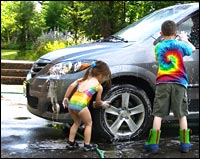Dear Umbra,
What can I do about washing my car in a more eco-friendly way? Is phosphate-free soap enough, or should I just suck it up and go to the drive-through car wash every time?
Katie
North Carolina
Dearest Katie,
You are one of those fastidious people I see busily washing their cars on Saturdays. I always wonder why some people are driven to go to such lengths, while others consider washing their cars somewhere below replacing their toothbrush on life’s long list of things to conveniently forget about. One of the little mysteries.

Fun for the kids, bad for the planet.
Photo: iStockphoto
Washing the car at home might be cheaper and handier, but I’m afraid you have to suck it up. It’s nearly always better to go to the commercial car wash. They use less water, and in the U.S. they are required to send their used water off for treatment, or to take other measures that lessen the impacts of their discharge. Some of them even reuse their water. Home washes, on the other hand, usually drain directly to storm sewers that eventually empty into streams, lakes, rivers, or bays, affecting our fish friends and the health of the water.
A survey a few years ago by the International Carwash Association (really!) found that a little under half of Americans prefer to suds up in the driveway, though. So if you do decide to keep washing the car at home, here are a few tips. Try not to do it very often. When you do it, park the car on your lawn, which acts as a natural filter for the soap, dirt, oil, and other gunk that would otherwise run down your driveway and straight into the drains. (Of course, you might not want that stuff on your lawn, either, if you stop to think about it.)
Next, consider the biggest problem with washing at home: water usage. One estimate says the average home wash uses 116 gallons of water. You don’t want to be a water-waster, do you? Use less by buying a nozzle that controls the flow from your hose, or by using a bucket — this will help you keep an eye on how much you’re using. You might even collect rainwater or gray water from your house and wash with that. Guess what commercial car washes do? Mix air and water half and half, so they get pressure without volume. Smart. And as a result, most commercial washes use 60 percent less water in the entire process than you use just rinsing off your car.
When it comes to soap, you might try an eco-friendly soap like Dr. Bronner’s, or no soap at all. The detergents in regular car cleaners hurt our fish friends by destroying a mucus layer that protects them from bacteria and parasites. They can also cause trouble by reducing the surface tension of water, which makes it easier for fish to absorb organic chemicals such as pesticides. Even the smallest amount of soap can make our fish friends unhappy — including those labeled biodegradable and low-phosphate.
Here’s a final idea: you could park your car and never drive again. After all, a parked car is a clean car, right? Just a thought.
Buffly,
Umbra

